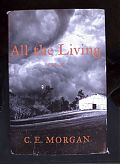
C. E. Morgan
All the Living
C. E. Morgan made The New Yorker’s ‘20 under 40’ list last summer though I had heard her name before, I don’t remember where. An interview with her sparked my interest again, so I bought All the Living last winter. I read it now thinking that she might fit on my Dorothy Allison streak, being from the South, writing about a small town, but the writings of these two are as removed as oil and water.
C. E. Morgan is about my age or maybe younger, she studied theology at Harvard Divinity. I bet she knows the Bible back to front (a trait I envy), for she made her character Bell Johnson a preacher and she wrote his sermons. Omnipresent in All the Living is a Biblical vagueness that encompasses much more than bits of the story and lends it a depth that spider webs up into proverb. There is the land Orren works and the weather the land is vulnerable to; the couple, Aloma and Orren, set to labour: they appear there, an anti-Eden, without mothers or fathers, without much.
[…] and all her pleasures so far had been such lusterless things, that she found she could not imagine [pleasure] all. The closest thing she could conjure was that it would be the exact opposite of lack, but even the hope of it did not feel the way she thought pleasure should, so she counted the nowhere days of her growing up and she waited.
Because Aloma had never known loving security, a family or freedom, and Orren just lost his family and because the farm that must be worked is difficult and the house that they live in is lonely, Orren and Aloma fluctuate between love, zero-compassion and sex. Aloma thinks that Orren doesn’t understand her when he is just busy. At the local church, where she wishes to pursue her passion of playing the piano, she meets the single preacher Bell.
All the Living flows out of these tensions in subtle ripples, so that even when the drama peaks, the waves somehow remain gentle. It is C.E. Morgan’s sleight of hand while rendering a powerful scene which makes this book so memorable. There is also her exquisite use of language, the verbs, the descriptions, like this one of the newborn calf:
The calf hauled air and Orren pattered his hands down the sodden hide, thumping and kneading and to get away from this unmothering, the calf moved, struggling up on its strange new legs, first placing weight on its pasterns, its nose pushing up and up as if it were pressing against a great and horrible weight, and then with another burst, it rose up on its legs, all four.
· · · · · · · · · · · · · · · · · · · ·